Klute Blu-ray Movie
HomeKlute Blu-ray Movie 
Criterion | 1971 | 114 min | Rated R | Jul 16, 2019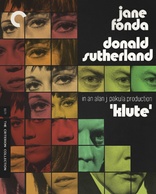
Movie rating
7.4 | / 10 |
Blu-ray rating
| Users | 4.5 | |
| Reviewer | 4.0 | |
| Overall | 4.0 |
Overview
Klute (1971)
A friend of small-town detective John Klute has disappeared. The only clue is a connection with a Manhattan call girl, Bree Daniels. Klute puts her under surveillance, gradually being drawn further into a world he's never experienced. But while Klute searches, someone is stalking Bree.
Starring: Jane Fonda, Donald Sutherland, Charles Cioffi, Roy Scheider, Dorothy TristanDirector: Alan J. Pakula
| Drama | 100% |
| Film-Noir | 45% |
| Psychological thriller | 23% |
| Crime | Insignificant |
| Mystery | Insignificant |
| Thriller | Insignificant |
Specifications
Video
Video codec: MPEG-4 AVC
Video resolution: 1080p
Aspect ratio: 2.35:1
Original aspect ratio: 2.39:1
Audio
English: LPCM Mono (48kHz, 24-bit)
Subtitles
English SDH
Discs
Blu-ray Disc
Single disc (1 BD)
Playback
Region A (locked)
Review
Rating summary
| Movie | 3.5 | |
| Video | 4.5 | |
| Audio | 5.0 | |
| Extras | 4.0 | |
| Overall | 4.0 |
Klute Blu-ray Movie Review
Reviewed by Dr. Svet Atanasov July 8, 2019Alan J. Pakula's "Klute" (1971) arrives on Blu-ray courtesy of Criterion. The supplemental features on the disc include an exclusive new program with Jane Fonda; new interview with writer Amy Fine Collins; archival interviews and documentaries; and more. The release also arrives with a a 26-page illustrated booklet featuring an essay by critic Mark Harris and excerpts from an archival interview with the director, as well as technical credits. In English, with optional English SDH subtitles for the main feature. Region-A "locked".
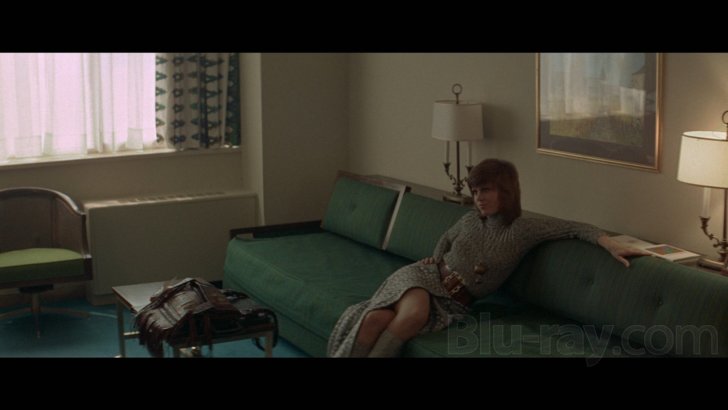
What kind of party did you have in mind?
“Nothing one does is wrong -- let it all hang out.” This statement is uttered early into the film by Jane Fonda’s character, a semi-retired call girl named Bree Daniels, and is actually what eventually puts everything that occurs in it in the proper context.
A small town in Pennsylvania. When industrial researcher Tom Gruneman (Robert Milli) goes missing in the Big Apple, his boss, Peter Cable (Charles Cioffi), hires clumsy private eye John Klute (Donald Sutherland) to figure out what has happened to him. Gruneman and Klute are old friends, so the latter already has plenty of valuable information to use during the search.
Klute is handed a stack of explicit letters that Gruneman wrote to Daniels, and they promptly send him on his way to the Big Apple. Once in the city, Klute quickly tracks down the call girl and learns that she is trying to trade her dirty gigs for a legit acting career in the fashion industry. At first there is a lot of static between the two, but then they gradually warm up to each other and begin a romantic relationship.
While trying to finish the job that he was hired to do, Klute reaches the very bottom of the call girl’s sleazy world where pimps, drug dealers, and all kinds of other shady characters have learned to coexist in perfect harmony.
This famous psychological thriller from Alan J. Pakula is still considered by many one of the quintessential films of the ‘70s, but it no longer feels like the courageous eye-opener that it once was. There is a good reason for this -- a lot of films that came after it went even further down its chosen path. (A great example is Paul Schrader’s thriller Hardcore in which George C. Scott plays a small-time businessman from the Midwest who goes looking for his teenage daughter after he learns that she has gotten involved with some really creepy pornographers in California).
The mystery surrounding the disappearance of the engineer is essentially a smart ruse that forces the audience to examine the evolving nature of Klute’s relationship with the call girl from different angles and then begin contemplating entirely different themes and issues. For example, initially she manipulates Klute just as she does her clients, but then begins to question her ‘performance’ and with it the identity of the modern woman she aspires to be. There is plenty of food for thought here. One of the most interesting revelations is that her independence is just another gig, so when there is no one around her she no longer acts her part and reveals her true self.
Klute of course is in the opposite corner, rationalizing his existence in an entirely different manner. Even though he isn’t particularly good at what he gets paid to do he is a pragmatic thinker who sees everything that occurs around him as an ongoing cycle of action and reaction, which is why his mind is constantly searching to identify the correct logic that makes everything easier to deconstruct. This process, however, requires a lot of acting as well, so even though Klute emerges from a different environment at the end he is also profiled as a social performer juggling multiple personalities.
Pakula worked with cinematographer Gordon Willis, who lit and lensed the film in a very particular way. There is a lot of soft noirish lighting and shadows that do many interesting things to capture the essence of the underground world that Klute visits while in the Big Apple.
Klute Blu-ray Movie, Video Quality 
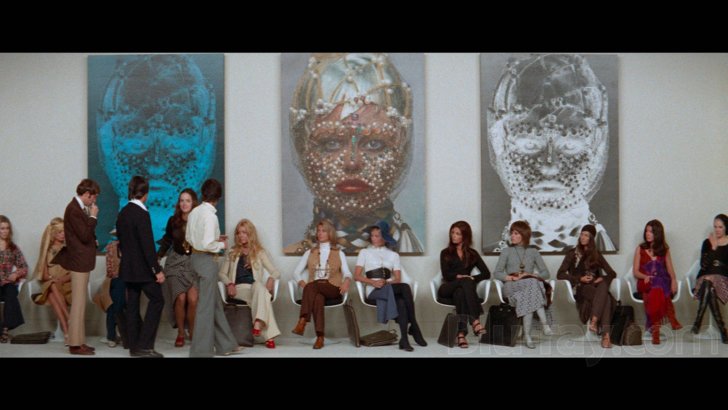
Presented in an aspect ratio of 2.39:1, encoded with MPEG-4 AVC and granted a 1080p transfer, Alan J. Pakula's Lute arrives on Blu-ray courtesy of Criterion.
The following text appears inside the booklet that is provided with this Blu-ray release:
"This new digital transfer was created in 16-bit 4K resolution on a Lasergraphics Director film scanner from the 35mm original camera negative, under the supervision of camera operator Michael Chapman. Thousands of instances of dirt, debris, scratches, and warps were manually removed using MTI Film's DRS, while Digital Vision's Phoenix was used for jitter, flicker, and small dirt. The original monaural soundtrack was remastered from the two-inch magnetic tape that included monaural dialog, music, and effects stems. Clicks, thumps, hiss, hum, and crackle were manually removed using Pro Tools HD and iZotope RX.
Transfer supervisor: Michael Chapman.
Colorist: Lee Kline/Criterion Post, New York; MTI Film, Hollywood.
Film scanning: Warner Bros. Motion Picture Imaging, Burbank, CA."
I have only one minor criticism. This film is lit and lensed in a very particular way, allowing soft light and shadows to do many interesting things. Some of the darker footage where there are subtle nuances is a bit too 'loose' for my taste, and I think that encoding optimizations should have been made to ensure that it look as effective -- and 'tight' -- as it would in its native resolution. Everything else looks terrific. I think that depth is excellent, though keep in mind that there are many, many different fluctuations that are part of the original cinematography. The color grading is outstanding as well. In fact, it is so much better than that of the old DVD release that Warner Bros. produced years ago that it expands and even reveals a lot of subtle nuances. (I took screencapture #5 from one sequence where the improvement is beyond dramatic). There are no stability issues. Debris, cuts, damage marks, and all other age-related imperfections have been carefully removed. (Note: This is a Region-A "locked" Blu-ray release. Therefore, you must have a native Region-A or Region-Free player in order to access its content).
Klute Blu-ray Movie, Audio Quality 
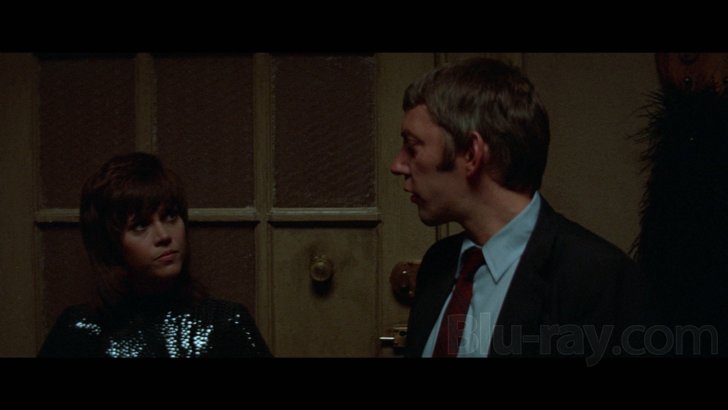
There is only one standard audio track on this Blu-ray release: English LPCM 1.0. Optional English SDH subtitles are provided for the main feature. When turned on, they appear inside the image frame.
The lossless track reproduces the period qualities of the original soundtrack very nicely. I compared a few areas where Michael Small's music has an important role on the Blu-ray and the DVD and I think that there is a pretty significant difference. The dialog is clean, stable, and very easy to follow.
Klute Blu-ray Movie, Special Features and Extras 
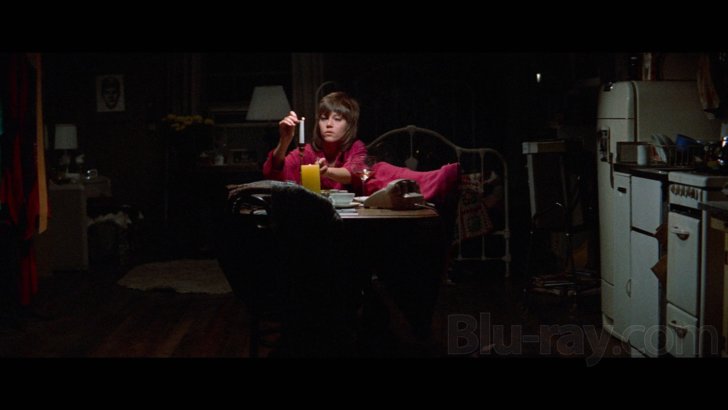
- Pakula - presented here is a collection of new interviews that were conducted by Matthew Miele for an upcoming documentary about the life and legacy of Alan J. Pakula. The bulk of the information addresses the psychology of Pakula's films and their visual appearance, and the making of Klute. Among the interviewees are critic Annette Insdorf, Steven Soderbergh, and actor Charles Cioffi. Also included are clips from an archival interview with the director. In English, not subtitled. (18 min, 1080p).
- Jane Fonda and Illeana Douglas - in this new video program, Jane Fonda recalls her work with Alan J. Pakula and cinematographer Gordon Willis on Klute, and discusses her research work as well as the film's main themes and period ambience. 'In English, not subtitled. (36 min, 1080p).
- The Look of "Klute" - in this new video program, fashion writer Amy Fine Collins takes a closer look at the period appearance and style of Klute. In English, not subtitled. (26 min, 1080p).
- Television Interviews -
1. Alan J. Pakula on The Dick Cavett Show (1978) - the director discusses his working methods as well as the working conditions in the film industry at the time. There are some specific comments about the 'sex scene' in Klute. In English, not subtitled. (28 min, 1080i).
2. Jane Fonda and Midge Mackenzie (1973) - In English, not subtitled. (38 min, 1080i).
- "Klute" in New York - this vintage program chronicles the just-launched production of Klute. Jane Fonda, Donald Sutherland, and Alan J. Pakula share their impression of a 'changed' New York, which cinematographer Gordon Willis talks about the style and look of the film. In English, not subtitled. (9 min, 1080p).
- Booklet - a 26-page illustrated booklet featuring "Truing to See Her" by Mark Harris, "She's Nowhere" by Alan J. Pakula, and technical credits.
Klute Blu-ray Movie, Overall Score and Recommendation 
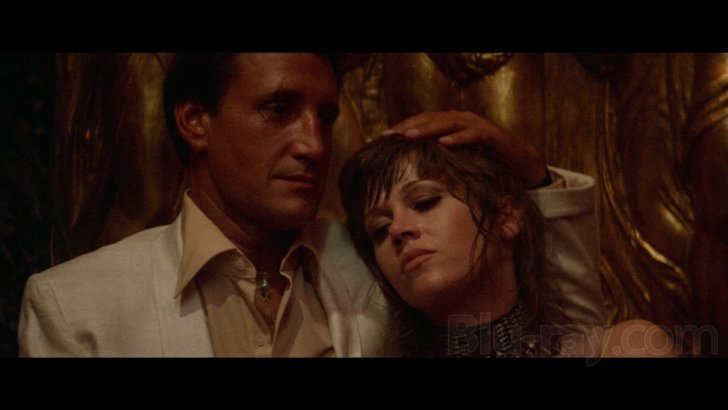
Klute is a chameleon that interchanges two different identities -- one is shaped up by classic noir aesthetics transported in a '70s setting, while the other is defined by a rather unconventional (at least for its era) interest in social psychology. This is what makes the film a unique time capsule. However, I think that there are other films that came after it that use the same blueprint to deliver even better commentary on various issues and themes that are part of its narrative. Criterion's upcoming release of Klute is sourced from a very nice new 4K restoration. RECOMMENDED.
Similar titles
Similar titles you might also like

L.A. Confidential
1997

Phantom Lady
1944

Where the Sidewalk Ends
Limited Edition to 3000 - SOLD OUT
1950

Cutter's Way
1981

The Long Goodbye
4K Restoration
1973

Double Indemnity 4K
1944

Gone Girl
2014

Clockers
1995

In the Heat of the Night 4K
Includes They Call Me MISTER Tibbs! and The Organization on standard BD
1967

Top of the Lake
2013

Mother
마더 / Madeo
2009

Devil in a Blue Dress 4K
1995

In the Electric Mist
2008

The Parallax View
1974

Blue Velvet 4K
1986

The Black Dahlia
2006

Two Men in Manhattan
Deux hommes dans Manhattan
1959

Insomnia
2002

The Crimson Kimono
Limited Edition to 3000
1959

Kiss Me Deadly
1955